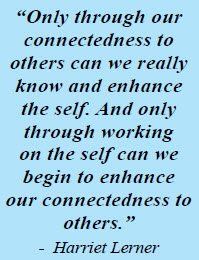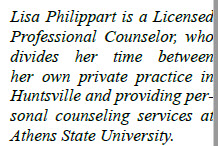Connectedness and Mental Health
 By: Lisa Philippart
By: Lisa Philippart
Do you remember way back in January, when we talked about rather than making resolutions, we would pick a word to make our focus and direction for the year? I hope you followed through and picked your word of purpose. I will now share with you that my word was — connection. I wanted to work toward making meaningful connections both within myself and with others. I have been striving to meet with those in the community who share my passions and interests. I have rekindled friendships and made new friends. I have intentionally “connected” with those who push me to be a better person and have a positive impact in my life. I also worked on connecting within myself…searching for what I believe, who I am, and who I want to become. I can honestly say I have experienced a year of growth toward my goal of connectedness. What I came to realize was that our positive connections have a profound effect on our mental wellbeing. Conversely, the lack of connectedness can negatively impact our social relationships, psychologically and physiologically. Let’s look at the ways isolation can harm, and connection may improve, our mental health.

Lack of connectedness breeds loneliness. And unfortunately, loneliness is infectious. Believe it or not, studies have shown that people seem to “catch” loneliness from one another. As people become lonelier, they move to the edges of social networks, creating a kind of domino effect. This means that when one person reported an increase of one day per week of loneliness, his or her close friends also reported an increase. And as people become lonelier over time, they begin to trust others less and less, creating a nasty cycle of seclusion and social isolation. Physiologically, loneliness may contribute to inflammation. Several studies have shown that people who reported being lonelier had higher biomarkers of inflammation, increased activity of inflammatory genes, and decreased activity of anti-viral genes. Loneliness seemed to also cause an elevated activity of the sympathetic nervous system — our flight or fight response. In particular, loneliness appears to affect the hypothalamic-pituitary-adrenal alignment, which regulates the stress hormones’ role in the stress response.

Loneliness is deeply connected to depression. This is related to the stress connection, but has a kind of chicken or egg situation. Does loneliness lead to depression or depression lead to loneliness? Most likely, a little bit of both, with each one contributing to the risk of the other. One of the symptoms of depression is social isolation, and if you are continuously lonely, your mood may suffer. There is a reciprocal relationship between loneliness and depression, where over time, each one contributes to the other. Taking this further, studies suggest that loneliness is a stronger predictor of mental health than mental health is a predictor of loneliness. And lastly, loneliness can affect cognition, maybe even increase dementia risk. Loneliness has been linked to problems with attention, executive function, and cognitive function. A study of 12,000 participants for ten years, showed that those who reported being loneliest had a 40% greater risk of dementia.

Social connection is perhaps the KEY factor in mental wellbeing. As much as loneliness can hurt us, social connectedness seems to not only undo these effects, it can protect our overall health. When looking at social connection and wellbeing, one seems to predict the other. People with stronger social connections report being the healthiest and happiest. In fact, social connectivity over a lifetime was the single most significant factor in predicting happiness and longevity. Even on a day-to-day scale, social interactions with casual acquaintances predict happiness, which suggests that we might not need to have only deep interactions to appreciate the psychological benefits of connection. The other piece of social connection is that it’s not just about inflammation and stress hormones…it provides mental and emotion comfort and increases resilience to trauma and anxiety. For people who have experienced serious sufferings, stronger social ties predict better outcomes. One study showed that people who mindfully boosted their social interactions and compassion had significantly reduced feelings of stress and discomfort, further confirming the profound effect of social connectedness on both our perceived stress levels and wellbeing.
Finally, relationships can create context for finding purpose and meaning in our lives. Relationships provide perspective to understanding the world and making sense of its ways. For example, when we struggle to make a decision, sometimes communicating the issue to another person can provide the insight we’re searching for. Coming together with a community in a shared activity or goal can lessen the load of existential dissatisfaction we may feel these days.
I look forward to selecting my word for 2020 and hope you will do the same. I wish you an emotionally happy and mentally thriving new year!
By: Lisa Philippart
Licensed Professional Counselor